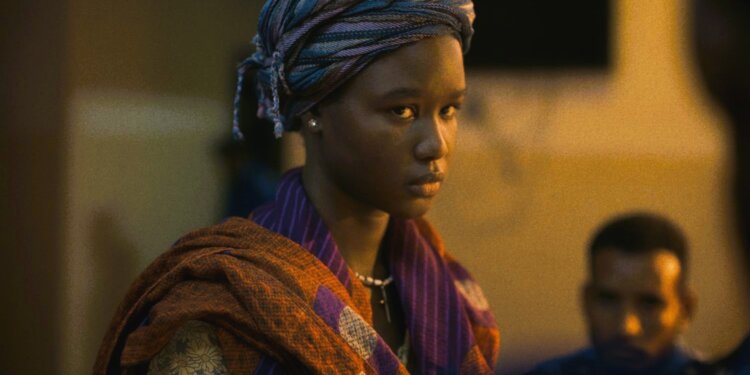It’s rare to encounter a mature and moving debut like Mohamed Kordofani’s Goodbye Julia. Vibrant, vibrating, captivating, and cruel, from the first scene to the last, Kordofani transports his audience into the heart of Sudan’s complex socio-political landscape, reflecting on heartbreaking yet resonating themes embedded in the country’s cultural and historical realities. Simple in structure yet rich in implication, the lives of only a few characters end up encapsulating the broader dilemmas at the heart of an entire nation.
Set against the backdrop of a divided Sudan – south and north – before South Sudan’s secession, Goodbye Julia weaves a narrative that begins in the kitchen of an upper-middle-class home in Khartoum during its twilight years. The film introduces Mona (Eiman Yousif), a Muslim and retired popular singer from the North, grappling with guilt over a southern man’s death – murdered by her husband Akram (Nazar Gomaa). Mona employs Julia (Siran Riak), a Christian southerner and the man’s unsuspecting widow, as her maid, who carries her own burdens, unaware of the tangled web she has found herself in. The two women’s lives intersect into a friendship that in every way personifies the complexities of Sudanese society—its antipathy, its scars, and the yearnings for redemption.
Goodbye Julia rides on the contrast between the lives of these two women, with Mona and her husband Akram living in material comfort, which breeds an irrational fear for the southerners, stereotyping them as inferior people not deserving of a similar life as theirs. On the other hand, Julia struggles for food, housing, work, and an education for her young son Danny (Stephanos James Peter), which forces her to make moral and material sacrifices to survive, including continuing as Mona and Akram’s maid even after discovering their hand in her husband’s death earlier on. Despite the deepening friendship that the two women develop, the guilt that spurns it and the growing racial animosity bubbling within the film offer a rather hopeless scope into a riff that grows beyond the controls of the characters.
Kordofani’s directorial finesse is evident in his sophisticated yet simple cinematography that captures Khartoum’s stark beauty—the dust-laden streets, its lingering unspoken history, and the tension that simmers forth. The film’s framing and blocking are skillfully executed, and scenes between Mona and Akram, in particular, are so gorgeously composed. Though they often face each other, they never seem to exist at the same level, eye to eye or body to body. One in focus, while the other isn’t, and the lighting to capture black skin in all its beauty cannot go unmentioned. Enriching native Sudanese music complements the authenticity of the colour and vibrant visuals, bathing the film in a culture that, though foreign, rings with a familiar rhythm.
The compelling performances of the actors, especially the two leads, Riak and Yousif, deliver a sincerity that transcends the already moving script. The film meticulously crafts each character, imbuing them with distinct challenges and convictions that continuously evolve throughout the story, all while infusing these performances with an understated realism. Despite the grandeur of its execution, Goodbye Julia also maintains remarkable restraint, avoiding melodramatic pitfalls and allowing the characters’ complex emotions to resonate with a quiet and earned intensity. Its subtlety makes Goodbye Julia a powerful cinematic experience, readily indulging in symbolism and the personal upheavals of characters yet still managing to capture the weight of a fragile society.
In conclusion, Goodbye Julia is less of a film and more of an experience—one that is beautifully crafted and deeply moving. Kordofani manages to tell a story that delicately handles the complex themes of guilt, grief, forgiveness, and reconciliation and, more importantly, highlights with care the difference between forgiveness and reconciliation. While offering the promise of hope by the end, the film doesn’t spare from the anguish realities it exists in, balancing to paint an informative but subtle picture of the conflict that embroiled the world’s newest nation in 2011. Chosen as Sudan’s selection for Best International Feature at 2024 Oscars, it’s a shame the film didn’t even make the nomination shortlist because it was more than deserving.
Goodbye Julia was the opening film at the just-concluded Zanzibar International Film Festival (ZIFF) 2024, alongside Kenya’s Mvera by Daudi Anguka.











